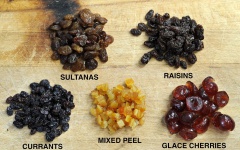Sultanas
| Infobox on Sultanas | |
|---|---|
| Example of Sultanas |  |
| Facts | |
| Origin | - |
| Stowage factor (in m3/t) | - |
| Humidity / moisture | - |
| Ventilation | - |
| Risk factors | - |
Sultanas
Contents
Description
The sultana is a "white" (pale green), oval seedless grape variety also called the sultanina, Thompson Seedless (United States), Lady de Coverly (England), and oval-fruited Kishmish (Turkey, Palestine).] In some countries, especially Commonwealth countries, it is also the name given to the raisin made from it; such sultana raisins are often called simply sultanas or sultanis. These are typically larger than Zante currants (which are actually a kind of dried grape, not currants in the botanical sense), and the Thompson variety is smaller than "normal" raisins. In the USA, the name "raisin" is applied to all dried grapes, so that the breakfast cereal known "Sultana Bran" in Australia and the United Kingdom is called Raisin Bran in the United States.
Thompson Sultana raisins are small, sweet and have a golden colour.
In the US, most raisins, including those with the typical dark brown colour, are made from the sultana grape, called the Thompson Seedless there. The term "sultana" refers to golden-coloured dried grapes, which may also be called "golden raisins". Any kind of grape may be used to produce golden raisins, and any kind of golden raisins from any kind of grape may be marketed as "sultanas". Moreover, the golden colour may come from a treatment with sulfur dioxide rather than traditional drying and preservation methods. Most non-organic sultana grapes in California and elsewhere are treated with the growth inducing plant hormone gibberellin. In other grapes gibberellin is released by the seeds.
In some jurisdictions, seedless dried grapes are classified as Sultana and Thompson raisins according to the drying method used. Sultanas are steeped in a solution of water, potassium carbonate and vegetable oil in order to hasten the drying process. Thompson raisins are not treated with this solution but are dried naturally, and thus require more drying time than sultanas. Because of this, Thompsons are a darker colour than Sultanas.
See Raisins for transport advice etc.











